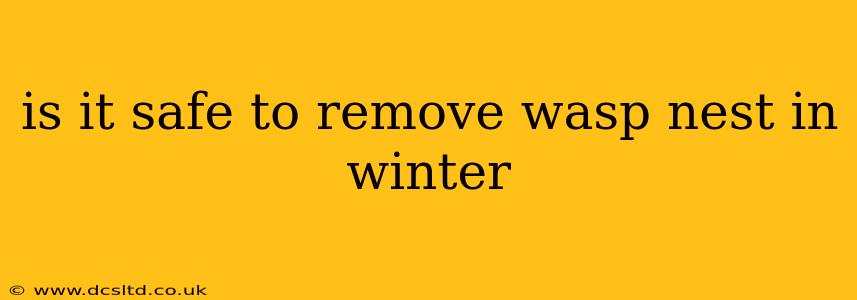Winter offers a seemingly opportune time to tackle that unwanted wasp nest hanging from your eaves or nestled in your shed. But is it actually safe to remove a wasp nest in winter? The short answer is: mostly yes, but with important caveats. While the risk is significantly reduced compared to the warmer months, there are still precautions to take.
Are Wasps Active in Winter?
This is the crucial question determining the safety of winter wasp nest removal. Most wasp species in temperate climates enter a state of diapause during winter. This means their activity drastically slows down, and the majority of the colony, including workers and the queen, will be dormant or dead. However, it's not a guaranteed total absence of activity. Some wasps might still be alive, especially in milder winters.
What are the Risks of Removing a Wasp Nest in Winter?
Even in winter, there are still potential risks associated with removing a wasp nest:
- Queen Survival: The queen wasp is the key to the colony's survival. If she survives the winter, she'll start a new nest in the spring. Removing the nest in winter might eliminate the current threat, but it won't necessarily prevent a new colony from forming in the same location the following year.
- Remaining Wasps: A few dormant wasps might still be alive within the nest. While less aggressive in winter, they can still sting if disturbed.
- Nest Material: Some wasp nests are made of materials that can cause skin irritation or allergic reactions if handled improperly. Always wear protective clothing.
- Structural Damage: Improper removal could damage the structure of your home, especially if the nest is deeply embedded.
How to Safely Remove a Wasp Nest in Winter?
If you decide to remove the nest yourself (professional removal is always the safest option), here are some crucial safety precautions:
- Assess the situation: Carefully inspect the nest from a safe distance to ensure no wasps are active.
- Protective gear: Wear protective clothing, including a long-sleeved shirt, pants, gloves, and eye protection. Consider a beekeeper's suit for optimal protection.
- Choose the right time: A cold, dry day is ideal to reduce wasp activity.
- Proper removal techniques: Use a sturdy pole or tool to carefully knock the nest down. If you're uncomfortable doing this, consider consulting a professional pest control service.
- Disposal: Seal the nest in a plastic bag and dispose of it according to your local guidelines.
What if I See Wasps Around the Nest in Winter?
If you observe any signs of wasp activity, do not attempt to remove the nest yourself. Contact a professional pest control service. They have the experience and equipment to handle the situation safely and effectively.
Is it Better to Leave the Nest Alone Over Winter?
Leaving the nest undisturbed is a perfectly acceptable option. The nest will likely decompose naturally over the winter months, and the risk of being stung is significantly reduced. This eliminates any risk of improper removal, and saves you time and money.
Should I Remove the Nest Myself or Call a Professional?
The decision of whether to tackle the nest yourself or call a professional depends on your comfort level, the nest's location and size, and your experience with pest removal. If you're unsure, it's always best to err on the side of caution and contact a professional. They have the necessary expertise and equipment to handle the situation safely and effectively, avoiding any potential risks.
How to Prevent Wasp Nests in the Future?
Preventing wasp nests from returning is just as important as removing existing ones. Consider:
- Sealing entry points: Repair any cracks or gaps in your home's exterior that wasps might use to build nests.
- Regular cleaning: Keep your gutters and surrounding areas clean and free of debris that could attract wasps.
- Removing attractants: Avoid leaving food or sugary drinks outdoors.
By following these guidelines and prioritizing safety, you can effectively and safely deal with a wasp nest, whether you choose to remove it yourself or call in the professionals. Remember, minimizing risk is key, and professional help is always a viable and often preferable option.
